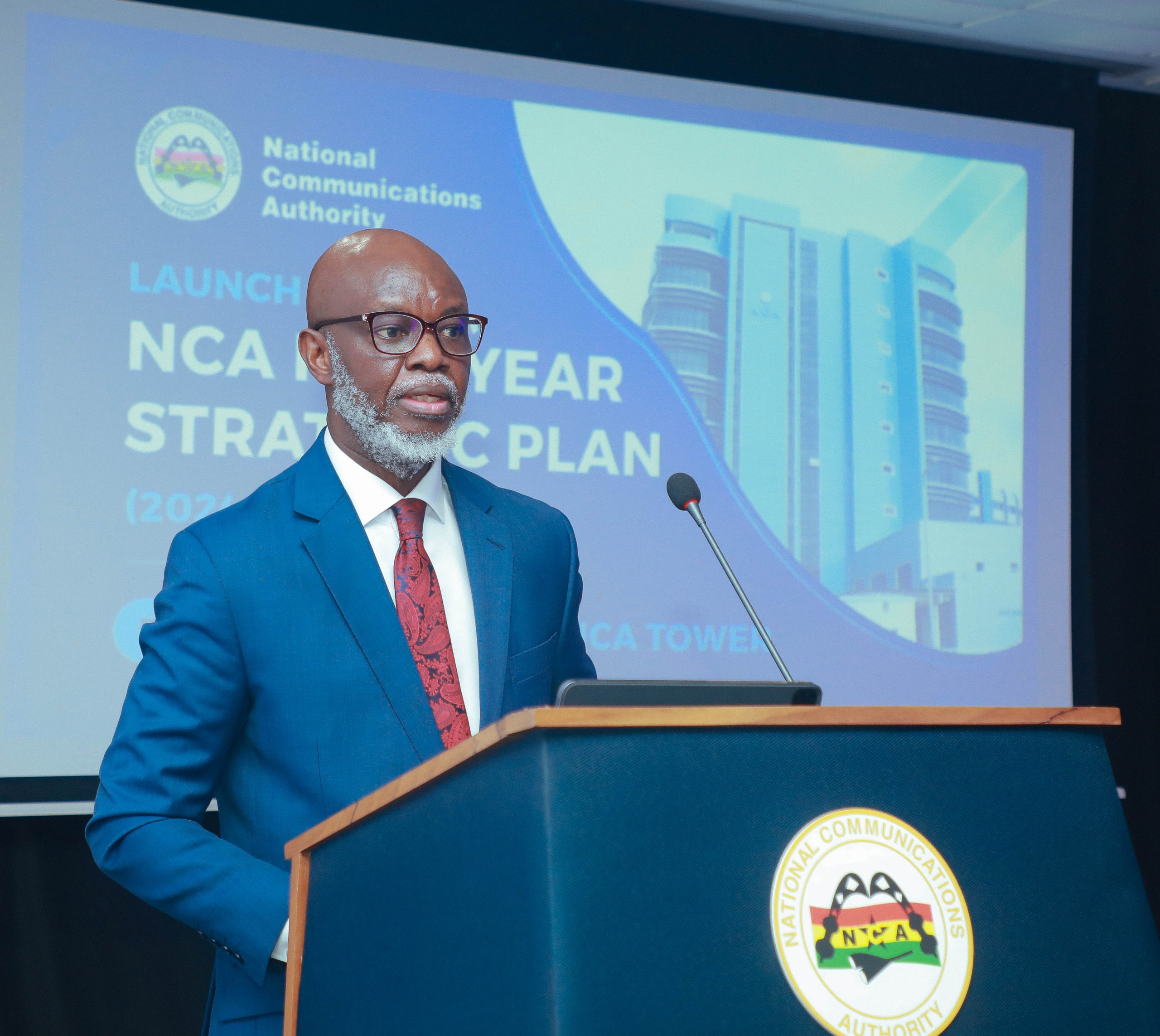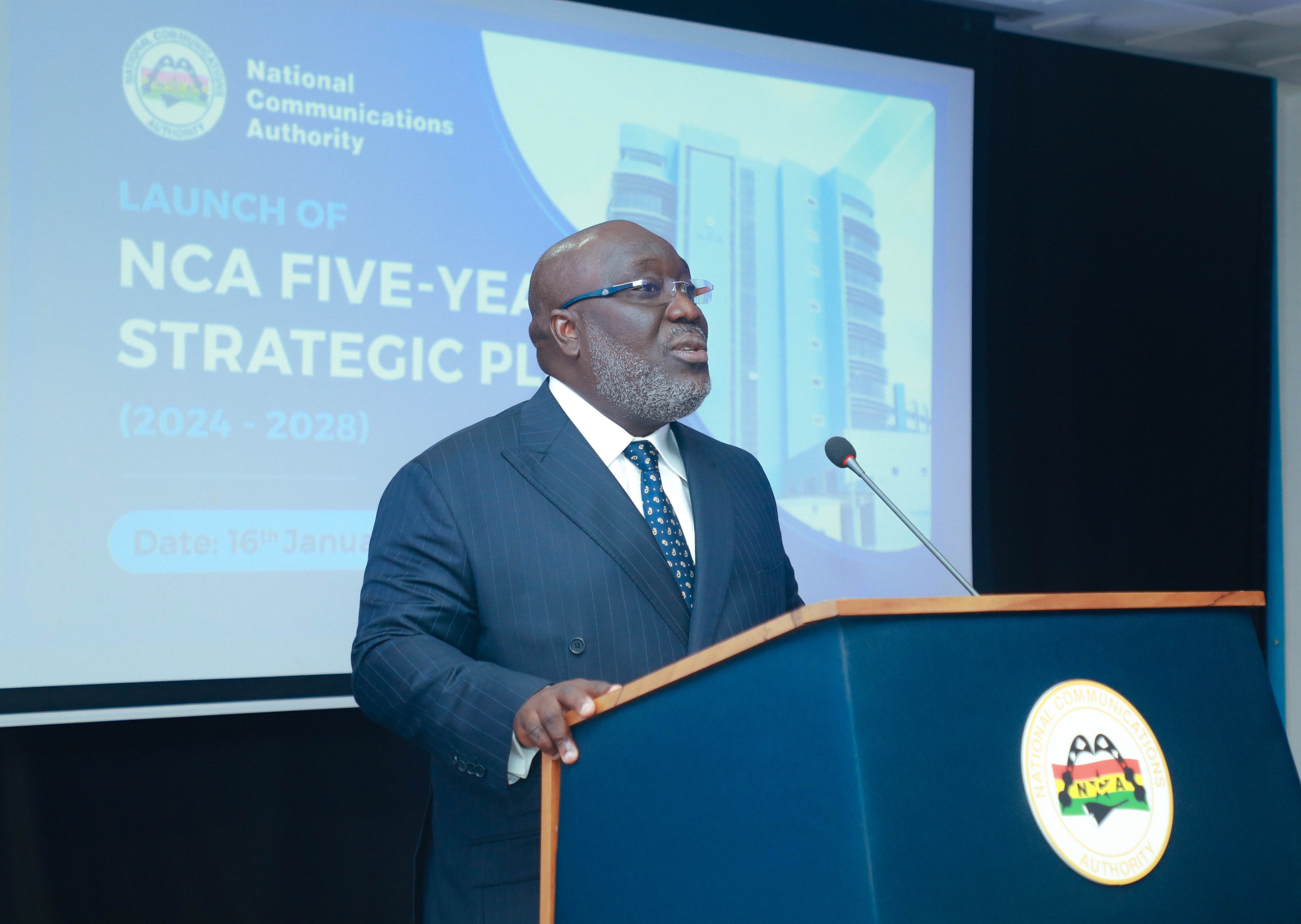The National Communications Authority (NCA) has released a 5-year strategic plan to guide its initiatives and operations for a greater impact in the communications industry.
The comprehensive 5-year plan covering 2024 to 2028 was formulated after engaging key stakeholders and hinged on four essential pillars: Research, Innovation and Process Improvement; Stakeholder Coordination and Engagement; Human Resource Strengthening; and Resource Optimization & Growth.
The plan was launched on Tuesday, January 16, 2024, at the NCA Tower in Accra.
The NCA hopes to be a beacon to project Ghana as a role model for other countries.
The plan is expected to propel the NCA to achieve its mandate in a modern era, with total commitment from staff and other external stakeholders.
The plan encompasses a detailed implementation, monitoring, and evaluation module to ensure the effective rollout of the innovative plans by the NCA.

Minister of Communication and Digitalisation, Mrs. Ursula Owusu-Ekuful, the special guest who delivered the keynote address, emphasized the need for such a critical blueprint to guide the dynamic nature of the sector.
“In our competitive market, technology is not just an operational aid; it is a strategic asset, and businesses that fail to adapt or innovate technologically risk becoming obsolete. The strategic plan of the NCA is forward-looking to inform stakeholders of its strategic direction and regulatory approaches going forward,” She emphasized.
She highlighted that the 5-year NCA plan captures all the stakeholders, environments, resources, the need for relationship building, stakeholder needs, the government’s digitalization agenda, and the global direction in communications and digitalization.
She praised the NCA’s dedication to excellence, innovation, and inclusivity and pointed out that the plan “reflects our commitment to fostering a communications environment that empowers individuals, promotes economic growth, and strengthens the social fabric of our nation”.
She hoped that the NCA would continue to engage with all stakeholders to better articulate, develop, and implement regulatory interventions consistent with the vision and goal of the regulatory entity.
She further advised the NCA to remain flexible and adapt to any change, if need be, but be consistent with the main and broad objectives of the strategic plan.
She further encouraged the NCA to learn from the best practices of other like-minded regulators, such as OFCOM in the United Kingdom, the Federal Communications Commission in the United States of America, and the Communications Commission in Kenya.
“These are regulators who have developed and published their strategic plans for accountability, and I urge the NCA to replicate the same”.

On his part, the Director General of the NCA, Dr Joe Anokye, outlined the importance of the 5-year NCA plan to catch up with new trends and technologies and set a framework for future innovations.
Dr. Anokye stressed that the communications industry, a fast-paced sector, “requires continuous innovations and strategies to keep the pace”.
Hence, the “development of strategies has become crucial in our bid to seize new opportunities and effectively overcome challenges”.
He was optimistic that the 5-year NCA plan would, amongst others, enhance productivity, align the authority’s goals with its resources, enhance communication and collaboration, and improve staff welfare.
“Over the next five years, we are setting out on a journey of transformation that will not only shape the NCA’s future but also leave a lasting impact on the communications Industry and the nation as a whole,” he added.

Meanwhile, the Board Chair of the NCA, Okatakyie Ababio Boakye Danquah II, has also shared insights into the plan.
“Our five-year strategic plan allows us to visualize our future from where we are today. It helps us to take concrete steps, as the plan illuminates our path towards the achievement of our goals,” he said.
He underscored the need for extensive consultation processes, which unveiled numerous untapped opportunities within the electronic communications sector.
“We have gained a wealth of knowledge, and we are optimistic that it will enable us to accomplish even more as we navigate a world of emerging technologies that continue to surprise us beyond imagination”.
He expressed confidence in the 5-year NCA plan as a critical communication tool for internal and external stakeholders and staff empowerment to hold the board and management accountable and vice versa.
Likewise, he said the blueprint will empower licensees, authorization holders, partners, and the public with adequate information to hold the NCA accountable.
The NCA hopes to build on the achievements chalked under the current leadership, which include the implementation of Digital Audio Broadcasting (DAB) to transform the Frequency Modulation (FM) landscape, placing Ghana as the first country in West Africa and only the fourth in Africa to deploy the technology.
Also, the NCA is championing free roaming services across Africa, beginning with Togo.
To that effect, a memorandum of understanding (MoU) has been signed between the telecom regulator of Togo and the NCA to implement mobile roaming services between the Mobile Network Operators (MNOs) in both countries.
In the long term, the NCA plans to sign roaming agreements and extend roaming to all West African Countries – hence the name ECOWAS roaming.
















